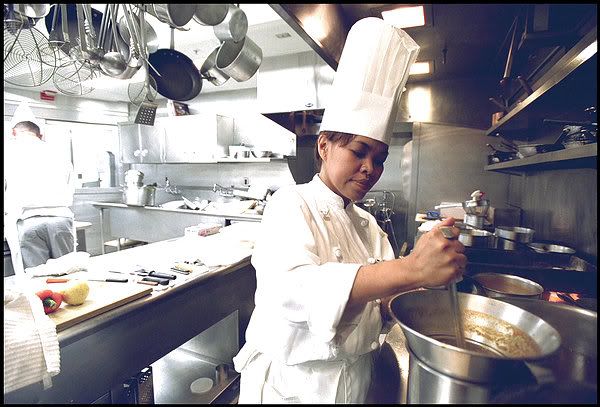
Cristeta Comerford, White House Chef - Ms. Comerford, who came to the United States when she was 23, received a bachelor's degree in food technology from the University of the Philippines, studied classic French cooking and worked in Austria. She also was chef at two Washington hotels. And she collaborated with the California chef John Ash to promote American game cooking.
CONCORD, N.H. � Speculating about a new chef at the White House has become � as one culinary insider puts it � fantasy football for foodies.
But as tempting as it may be to see the Obama family's choice as the ultimate "Top Chef" competition, former White House chefs say the job is about selfless service, not star power.
Walter Scheib, White House executive chef for Presidents Bill Clinton and George W. Bush, believes there's a 90 percent chance the new administration will stick with his successor, Cristeta Comerford. And if the Obamas do hire someone new, it won't be a television personality or any of the celebrity names bandied about on food and political blogs, he said.
"None of these people have any idea what the job is about," said Scheib. "And they're temperamentally not suited for it. You have to be a person who has a real heart of service, and it can't be someone who needs to see themselves on camera."
Roland Mesnier, who retired in 2004 after 25 years as the White House's executive pastry chef, would never recommend a TV chef for the first family.
"Celebrity chefs, in my book, are not chefs. They're entertainers," he said. "All these people on TV? Forget it."
A spokesman for President-elect Barack Obama said it's too early to comment whether there will be a new executive chef. But outside speculation has focused on Art Smith, Oprah Winfrey's personal chef; NBA star Carmelo Anthony's personal chef, Daniel Young, who cooked for Obama at the Democratic National Convention; and Rick Bayless, whose Chicago restaurant Topolobampo is a favorite of Obama's.
At the same time, members of the Organic Consumers Association are organizing a letter-writing campaign urging Obama to promote healthy, sustainable and organic eating by hiring a well-known organic chef such as Nora Pouillon or Alice Waters.
None of the above would be a good fit, said Scheib.
"I get a kick out of all these people saying the No. 1 thing should be green, or sustainable or this, that or the other thing. They're missing the point. It's not about advancing your agenda. It's not about building your repertoire. It's not about getting your business promoted," he said. "It's about serving the first family, first, last and in every way. That's the only job."
The head chef earns $80,000-$100,000 a year creating menus for state dinners, holiday functions, receptions and official luncheons hosted by the president and first lady. Though the gala affairs are organizational challenges, Scheib says the greater challenge comes on the personal side: feeding the president, his family and guests.
A White House chef's sensitivity and understanding is just as important as culinary skills, given that the chef is among the few people who interact with the first family in private, Scheib and Mesnier say.
"For the domestic staff � and for all the fancy titles, that's all the people in the residence are � how they learn the temperament and temperature of the first family is crucial. It makes doing a state dinner look easy," said Scheib, who has written a book and started a business planning private events since leaving the White House. "The challenge is how you give them everything they need and at the same time expand their horizons if they choose, but at the same time, not being underfoot."
Or as Mesnier puts it, "You have to be almost a clairvoyant, someone who can read a crystal ball and be able to judge what would they love today."
Both men give Comerford, the first woman and first minority to serve as executive chef, high marks in that regard. Neither believes she will be replaced, an opinion not shared by Tim Ryan, president of the Culinary Institute of America, which has sent several alumni (including Scheib) to the White House.
Though he says speculation about celebrity chefs is "like engaging in fantasy football," he believes the Obamas will seize the opportunity to make changes. He suggests another CIA grad as a candidate � John Doherty, executive chef at New York's Waldorf-Astoria hotel � but said Obama could also shake things up with a rotating cast of big name chefs for state dinners, much in the same way John F. Kennedy invited famed artists and performers to the White House.
"Chefs are great performers. So to take a page from Kennedy's playbook and recognize the artistic performances of the culinary greats, each state dinner could be organized by different high-profile chefs," he said.
That way, Obama could bring in chefs like Thomas Keller and Jonathan Beno � the first American chefs to be granted three Michelin stars � molecular gastronomy guru Grant Achatz or Ethiopian-born Marcus Samuelson of Aquavit restaurant. Such an arrangement would allow the president to "capture some of the star power but in a practical and realistic way," Ryan said.
Curiosity about the White House chef is nothing new, Ryan said, but it has been amplified by the public's Food Network-fed interest in all things food-related.
"I recall back to the Reagan administration getting calls about it ... so people are always interested in the White House chef," he said. "But that said, it's got to be exponentially greater today because the interest in food is so much greater."
___
On the Net:
Walter Scheib:
http://www.theamericanchef.com Roland Mesnier:
http://chefrolandmesnier.com Culinary Institute of America:
http://www.ciachef.edu